November 2011
Dear Friends of Kythera,
last week I had morning tea with Mathias, the IT engineer who originally programmed Kythera-Family.net (KFN). Back in 2002 I conceived the site and he programmed it at a time when the term "social media" didn't even exist! Facebook & Co. are only a slightly different social media "animal" from the same species as KFN. (If I'd only conceived it for hedonistic teenagers we might have been 40 billion dollars richer now!) But seriously, Kythera-Family.net has, in its short lifetime, brought hundreds of Kytherians together - relatives and many others with a common passion for our island - and provided a channel for all to collect and share their pictures, stories, and much much more. So Kythera can probably lay claim to having the first community social-media site in the world!
Mathias complained that he hadn't worked on anything really "worthwhile" since our collaboration on KFN. We brainstormed a while on new projects and came up with one which we are still mulling over: "A Million Visitors to Greece". Remember what Greece USED to be famous for, before the debt crisis raised its ugly head? Greece was the country of hospitality - warm friendly people, treating every stranger as if a close friend, a country of delicious food, sun and beaches, hundreds of islands to explore, churches on mountaintops, grilled octopus, moussaka and retsina, island hopping and a secluded bay for anyone willing to walk a bit further. Of course, Greece is still all of those things. And there lies the problem. Greece is as attractive as ever, but the image it currently has distracts from that. And because so many people want to help Greece but don't know how, we just have to remind them that visiting the country is a great way to do it.
Our concept isn't just to advertise Greece as a holiday destination, but instead to allow Greeks and visitors to discover each other again, as one did in the "old days" when the tourist infrastructure there wasn't quite as developed as it is now and an island taxi driver was as likely to take you home to his family as to your original destination. The website we would set up at "A Million Visitors to Greece" would allow individual Greeks to announce their willingness to take in tourists into their own homes for a few days for a reasonable charge, allowing not only private homes to earn money from extra visitors but also open the path to new friendships and multicultural interaction. Of course the "million" visitors would go on to see other areas of Greece, using the usual tourist infrastructure - ferries and hotels and restaurants would thus also profit. The concept includes a website, where Greeks and their potential guests can find each other, as well as a PR and social media campaign to get the word around. If you're interested in helping us in any way, please let me know!
The Great Walls of Kythera
Our book project "The Great Walls of Kythera" has finally reached the design phase - it took this long to get most of the high-resolution versions of the pictures from those who had submitted. We are still missing quite a few pictures, so if any of you would still like to submit new photographs of walls on Kythera, we're opening the submission window again. In the next newsletter I'll be able to include a few pictures of the cover and layout. Sorry for the delay!
Maria
Anyone who has received and read our email newsletter over the past three years will have almost certainly read the nostalgic and passionate articles by "Maria of Lourandianika". Of all the content of these newsletters, hers receives the most response - usually praise and support - for her fearless willingness to tell the true story of her life as a child of strict Kytherian parents. Maria sadly suffers from more than a few severe genetic diseases such as scleroderma and lupus, and has reached a particularly difficult and painful stage in her affliction's progression. And yet still she finds the strength to write her articles and send them to me. Always on time. If you've enjoyed her writings but haven't mentioned it to her directly, now might be a good time to do it: maria.wwhyte@gmail.com
Best regards from a sunny but chilly Berlin,
James Prineas (james@kythera-family.net)
.._ _ _..._ _ _..._ _ _..._ _ _..._ _ _..._ _ _..._ _ _..._ _ _
Mitchell Notaras. A Eulogy by his twin brother, Angelo Notaras
Eulogy by Angelo Notaras at St George Parish Church, Rose Bay NSW Australia, Saturday 15th October, 2011, for his twin brother Mitchell, who passed away on 30/7/11.
Family and Friends,
We are here today to celebrate the life of our dear brother and family man, Mitchell, who passed away in Frelingianka Kythera on the 30th July this year. Mitchell was a very modest person and only recently were we to become fully aware of his many outstanding achievements, some of which were spoke about in the liturgy this morning by Father Gerasimos, as well as noted in the memorial service presentation you have. We are pleased that Fiona and Lorna, Mitchell’s daughters, have travelled from London for today’s service.
They did ask me about Mitchell’s early life growing up in Grafton so I would like to speak about this period of his life. Mitch and I were born on the 26th March 1933 and he being a gentleman said: “after you sir” and I became the first born of the twins in a family of loving and caring parents. We lived on the banks of the mighty Clarence River, a very dangerous place to be if you could not swim. Dad soon taught us to swim at a very early age. Mitchell at the age of 9 or 10 became the youngest swimmer to cross the river on his own, a good 600 metres against river currents, waves and wind. At the age of eight we went into business together looking for bottles and bags to sell to the scrap merchants for the war effort. Dad noted our business activities and gave us a job Saturday mornings working in the Marble Bar Café standing on a mintie tin to collect the cash from customers to put into the till, as well as serve customers. Dad also taught us about customer relations. He always said: “you must have happy customers otherwise you do not have a business”. What wonderful advice to learn at such an early age.
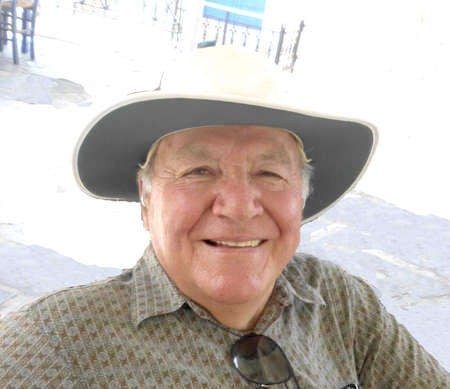
"Mitch" at the platia in Potamos, where he could be found each Sunday drinking coffee with friends and family at the market.
The early years were full of fun, activity and enjoyment, we made canoes out of sheets of iron (which most times sank a few hundred metres off shore). We fished, swam, surfed, jumped off huge trees along the banks into the river, even played Tarzan in one large tree full of monkey vines. Dad built us a boat shed and a boat and the fun continued exploring the Clarence River. We used to put up a sail and go for miles in one direction only, have to row back as the boat was square rigged and could not sail against the wind.
We made many lifelong friends in Grafton, a number of you are here today, even traveling down from interstate. Thank you for being here. In those days everyone walked or rode a bike to school, which on many occasions after school, having many deviations of visiting friends or simply just riding around. When we had a lot of rain, the river rose and large pieces of buoyant water-hyacinth would float down the river. We used to swim out and hop on and float down, hop off, walk back to our starting point and do it again.
One day, when we were doing this activity, both Mitchell and I broke the world 50 metre freestyle swim record. It happened like this. It rained, the river rose and we swam out to a large floating island of hyacinth. We hopped on and floated down a 100 metres and realized there was another occupant besides us in the form of a huge black bellied water snake watching and slithering towards us. That’s when we broke, unofficially, the world 50 metre freestyle swim record. It was also the last time we did hop on and hop off activities.
During the war years there were no toys, a few cars, few if any holidays, no TV and you had to find your own way to school from a very early age, and yet we had fun and enjoyment denied to young people today. Dad took us deep sea and estuary fishing, shooting, walking in the bush, and appreciating nature. We also became very competitive surf swimmers. Life started to get serious for us when we entered high school and we had to settle down to a more disciplined life of schooling. Prior to entering high school Dad, to keep us out of mischief, sent us to learn to type during the Christmas holidays. In those days all documents were laboriously retyped, there were no photocopiers. Mitchell was a very good typist and in first year at high school started his own newspaper at a penny a copy. He secured advertising, wrote up the storyline, typed up copy on a waxed sheet and printed the paper on the school Gestetner printing machine. Mitchell also represented the school in various football teams.
When we reached intermediate certificate, Mitchell’s scholastic ability started to show coming top of the class many times as well as third in the state in mathematics. Mitchell’s maths teacher was so proud of him as he was his best ever pupil. When he entered the class to announce the results his chest went out and I thought all the buttons on his shirt would pop off. Dad sent us to Newington College Sydney as borders for the final 2 years to round off our education. Newington those days was not the Newington of today. It was a tough school with left over world one temporary classrooms, etc.
Mitch and I slept on balcony one, a big honour those days, fully exposed to the weather, hot in summer, cold in winter. Mitch was in the top class at Newington, but hardly ever studied. I remember during study week prior to the Leaving Certificate he spent most of the time down at the pool or playing sport. Mitch had a good exam result and gained a “Commonwealth Scholarship” to do medicine.He was certainly influenced to take up medicine by the three doctor brothers (and later a fourth) of the Kalokerinos family, especially Archie Kalokerinos. Four brothers, all doctors, from a Kytherian immigrant family, quite remarkable.
It was at this point of our life that we separated from being always together and doing everything together. For 16 years we were inseparable. Mitchell went to the University of Sydney to study medicine and I went to the University of hard knocks to study commerce and where incidentally, I am still a student and learning – 62 years later.
The separation happened with good feelings between us as we were both excited about the new careers that awaited us in adulthood. In the ensuing years we always kept in contact. During the sixties and seventies I travelled annually to Europe on business and always took the opportunity to visit Mitchell in London. We always were pleased to meet and discuss our respective careers. We both took a great interest in what each one of us were doing and encouraged each other to do better. There was never any sibling rivalry between us and we always expressed views to help each other and the family.
Mitchell passed away very suddenly and peacefully in the very room he was conceived in 78 years earlier as Dad and Mum had the start of their honeymoon in the ancestral home that Mitch and Benta restored.
Several years ago Mitchell joined my brother John and cousin Spiro to purchase the heritage listed Saraton Theatre Grafton from the family. Built in 1926 by our father and Uncle Jack when they were only 31 years of age, and we restored it to its former glory. Mitchell was very proud of the result, with the addition of two cinemas the project was awarded by the National Trust as best restoration of a historic building.
Mitchell was a good brother, a good father, a good son, a good friend to all of us. We will all miss him. We will miss his emails, his phone calls and his emailed jokes. Most of you may remember his last joke about the ten commandments, it was a good one.
Farewell dear brother.
.._ _ _..._ _ _..._ _ _..._ _ _..._ _ _..._ _ _..._ _ _..._ _ _
Kapsali Turtle
by Peter Aroney
From our balcony in Aphrodite Apartments we first saw one of the turtles in Kapsali Bay and Yiannis told us that two are regularly seen. So we headed to the beach the next day with snorkeling gear and couldn't believe our luck when we spotted one within 15 metres of the beach.
Below the picture taken with an underwater camera. Also got some video as well: http://www.youtube.com/watch?v=Zw7avO2Tlbs
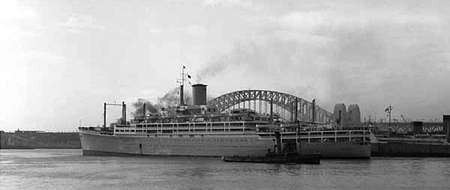
.._ _ _..._ _ _..._ _ _..._ _ _..._ _ _..._ _ _..._ _ _..._ _ _
E-BOOK LAUNCH: “KATSEHAMOS AND THE GREAT IDEA”
The true story of young Greeks in the early 20th century who were called upon to fight endless wars for Greece's 'Great Idea'. As teenagers they emigrated to Missouri, USA. Later, after returning to fight in the Balkan Wars, the exhaustion of their country forced them to leave again, this time for Australia. There they built a cafe and cinema business and learnt that money can be made in a new country, but just as easily lost.
Three Greek immigrants from the island of Kythera established the Roxy cafe and cinema in 1936. This Depression-era enterprise in a small country town exemplifies the Greek migration experience between the world wars: one that helped to shape Australia.
The story is one of great ideas and hopes, a story of disappointment, endurance and – for some of those involved – ultimately triumph.
Situated in the small town of Bingara, northern New South Wales, the Roxy has recently been restored in all its art deco glory. In 2004 the magnificent theatre was reopened with the help of government grants to the local council. In 2011 a further $750,000 grant is facilitating the restoration of the original Greek cafe, and the establishment of a ‘Museum of Greek Settlement’ in the rooms above.
A glimpse of the story first came to light in a PhD thesis undertaken in the 1990's by Kevin Cork, then President of the Australian Theatre Historical Society. Entitled "Parthenons Down Under", the thesis revealed the significant commercial and cultural contribution to Australia made by Greek motion picture exhibitors.
In 2006, the fascinating Bingara Roxy story was revealed when Peter Prineas – grandson of Peter Feros, one of the original founders of the cinema – published his book "Katsehamos and the Great Idea: a true story of Greeks and Australians in the early 20th century".
“Katsehamos" was republished in October 2011 as an E-Book and is available from Amazon.
ebook at Amazon
.._ _ _..._ _ _..._ _ _..._ _ _..._ _ _..._ _ _..._ _ _..._ _ _
Get steamy!
I few newsletters ago I mentioned that not filling your kettle with more water than you actually need can save you lots on your electricity bill (a kettle uses as much power in a minute as a washing machine in an hour). It follows that the less water you boil for other things the less energy you will need. You only need a few centimetres of water to steam vegetables, as opposed to a whole pot to boil them. They taste at least as good steamed and apparently more vitamins are retained as well. Chopping your potatoes in half (or quarters) also reduces their cooking/steaming time considerably.
We can cut back on 15% of greenhouse gass emissions just by saving electricity at home! Spread the word!
.._ _ _..._ _ _..._ _ _..._ _ _..._ _ _..._ _ _..._ _ _..._ _ _
So far we've managed to raise more than €400 000 towards the new museum complex for Kythera. That's about a tenth of what we need to provide Kythera and Greece with a major draw card and cultural masterpiece. If you're in a position to help fund the museum, please consider it. Don't forget, it won't be just a unique museum to Aphrodite, the island's mythological goddess. It will house an Historical Museum which will graphically tell the wonderful and sometimes tragic story of our island, from its important strategic position as a Minoan port to its modern migration period in which it sent its sons and daughters to all corners of the earth.
And then there are the plans for a Natural History Wing filled with samples of the island's flora, fauna and geology. The Migration Centre will provide not only pictures, maps and stories documenting the long tradition of emigration from Kythera, it will also house records and access to documentation so that family research can be actively pursued there. And we shouldn't forget the Sculpture Garden. And a Religious History Museum which will reveal many miraculous facts about our island's saints, churches and monasteries.
Which reminds me: did you know the story of how the Monastery of St. George above Avlemonas was built? This is the little I remember from what Papa Giorgi told me a few years ago (don't quote me on this): apparently Empress Katerina of Russia survived being shipwrecked in heavy fog off Paliopoli hundreds of years ago. In her gratitude, she swore to build a church on the first peak she could see when the fog lifted. St. George was the spot which first came to view, and she is said to have called for hundreds of Russian sailors and soldiers to line up between the rock quarry between Paliopoli and Avlemonas (visible today on the left hand side of the road as you drive towards Avlemonas), and the stone was cut and passed from hand to hand between the thousands of Russians up the mountain to the site of St. George. Legend has it that just as the first stone reached the top, the last stone was cut at the quarry below. It must have been an impressive sight, that long line of Russians passing backbreaking blocks of sandstone up the mountain. Papa Giorgi pointed out the two Russian mosaics in the floor of St. George's Church but I can't remember what he said about them - can anyone help?
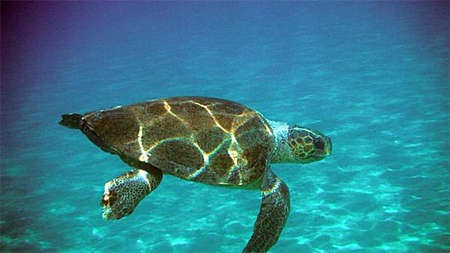
A Russian mosaic on the floor of the church at St. George's Monastery above Avlemonas
.._ _ _..._ _ _..._ _ _..._ _ _..._ _ _..._ _ _..._ _ _..._ _ _
You're Joking
by Stephen Trifyllis
Is this the type of permit granted in Kythera now? This eyesore in Trifyllianika has just been constructed in a classical and beautiful village. This should not be allowed in any village as it ruins the charm and look of the village which is surrounded by gracious old homes. What sort of council would allow this type of building in a historical village... this has got to stop!!! , The people who constructed this better have a permit and if they did shame on them! We know who you are and questions will be asked. And if no permit, be prepared for it to be demolished.
Wake up Kythera! You are starting to look like rural Australia!
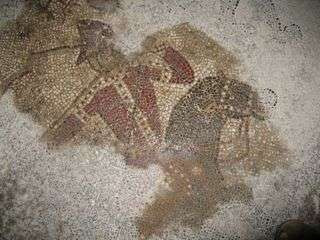
.._ _ _..._ _ _..._ _ _..._ _ _..._ _ _..._ _ _..._ _ _..._ _ _.._ _
A Dream to be Fulfilled
WORDS OF A YOUNG KYTHERIAN. THEN AND NOW.
The words below were written by a 15 year old girl. Written in a leather journal which now shows the passage of time: it has been read over the years from childhood to adulthood. They are the words of a young girl embarking on the biggest experience of her life, going from life in Australia, sailing into the unknown, to experience a year in Kythera, to experience life on the island of her parents. A life so different from the one lived so far.
Too many memories to recall clearly. I need to look once more at the pages written directly into the journal. To share the thoughts of a child, not aware that in the future, these memories would be shared by many fellow Kytherians.
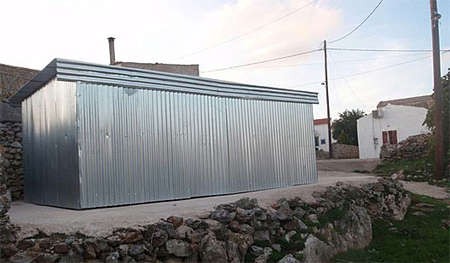
23rd August, 1957 – Friday. S.S. Oronsay.
"Today we left on the “S.S. Oronsay” for Greece. We were given a wonderful farewell at Piermont.
I didn’t expect any gifts or flowers, and I was greatly surprised when I saw baskets and boxes of flowers come from many people. There were also tins of sweets, boxes and blocks of chocolate, and also bags of fruit. There were sprays of flowers and small bouquets. I also received a pen. All these presents were accompanied by cute Bon Voyage cards.
While I am writing this, I am quite dizzy. I thought I would be a good sailor, but it seems I won’t be. We had practice at putting on life belts. I did not enjoy that. We had many photos taken, and I hear that they will be in the paper. I must write to my friends soon or they will think I have let them down.
We arrive in Melbourne tomorrow, and stay for two days, leaving on Monday.
I still can’t believe that at last we’re going to Greece. To see everyone is wonderful.
24th August 1957 – Saturday. “S.S.Oronsay”.
Today, it’s our second day at traveling. I’m sitting in a sun chair on the deck 8. Koula has a headache, and is lying down in the cabin. Everyone is very nice and helpful. Up until 9 o’clock today, I have made 6 friends: a married couple, a young girl, a steward, another gentleman and our cabin steward who is most helpful and amusing.
Tonight we will reach Melbourne at half past nine. We will leave on Monday at 4 p.m. We had rough seas and rain last night, and I was quite dizzy. There is fog up ahead. I hope everything will be all right. We had a lovely tea of chicken, ham and potato scallops. Mr. Springette, our cabin steward, is teasing us terribly, but it is fun talking to him. We put on slacks after dinner and met another girl of 17 and played deck games.
We have now reached Melbourne. It was fun seeing the pilot come on board.
I still can’t believe we are sailing for Greece. I suppose I will sooner or later."
Little did I know then that the happiest year of my life would be spent on a small island called Kythera.
I have chosen to write the exact words from the journal which I recorded my every thought and experience as a 15 year old girl. A Kytherian experiencing such a wonderful experience, choosing not to correct errors in spelling, nor how words have been written, instead transferring each word, sharing with my fellow Kytherians my life as it was then.
This was the beginning of the greatest experience of my life. A life which had been so sheltered in my strict Kytherian family in Sydney. Suddenly I was experiencing friendships with non-Kytherians. As an adult now, with my faith strong, I pray I will make, what I call a pilgrimage to Kythera. To say my final goodbyes, keeping the promise made to my beloved uncle, to place a cross bearing his name on his resting place. To show that this gentle man that I adored him, he who had been buried in a broken-down shelter kept for animals. The stones I had placed there in the shape of a cross have probably long been moved, leaving my uncle again with no one knowing his final resting place.
To sit again, one final time, in my grandfathers church, lighting a candle for loved ones. Then, should I dare to ask one of the new residence of the family home in Louradianika if by some chance the old wooden couch had been kept? Could I check the wooden arms of this piece of furniture to see if they still harbour its secret of the silver cutlery my beloved Uncle chose to hide there?
Memories are the greatest gift of all. Never erased, nor forgotten, intermingled with joy, and tears, regret and hope. Memories treasured and priceless, having no monitory value, but steeped in emotion.
Maria (Marcellos) Whyte
maria.wwhyte@gmail.com
4 Trinity Crescent.,
Sippy Downs 4556
Queensland.
_ _..._ _ _..._ _ _..._ _ _..._ _ _..._ _ _..._ _ _..._ _ _.._ _